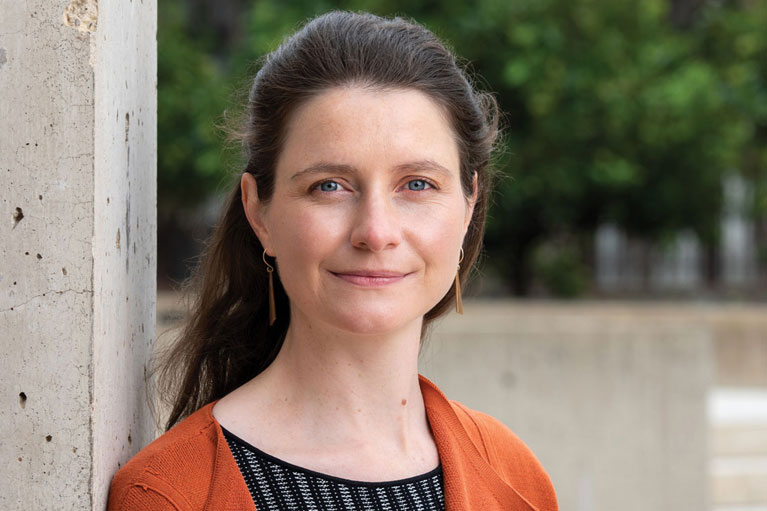Profiles – Helen McRae
Less than a year into Helen McRae’s graduate degree in medical research, her cousin was diagnosed with lung cancer. “She was in an immunotherapy clinical trial and her tumor appeared to shrink,” says McRae. McRae knew little about immunotherapies at the time but learned that unlike traditional cancer treatments that target cancer cells, immunotherapies assist the patient’s immune system in fighting the cancer. “Ultimately, it didn’t work out, which showed me the promise of this newer approach to cancer treatment, but also how much more research is needed to help it work for more people.”
Now a postdoctoral fellow at Salk, McRae researches new ways to control tumor growth by using the body’s immune cells. Her goal is to help discover and develop more effective immunotherapies, so that cancer patients will have better treatment options in the future.

Postdoctoral Fellow, Hargreaves Lab
Raised in Victoria, Australia, McRae became enthralled with science in high school. “When my older brother told me about evolutionary theory, it sounded so cool!” says McRae, “I wanted to learn more about how our genes evolved and their role in health and disease.”
McRae later pursued her bachelor’s degree in genetics at the University of Melbourne. She didn’t know what a career in science entailed at the time—she was just passionate about learning. She eventually joined a structural biology lab at the Walter and Eliza Hall Institute, where she studied cell-to-cell signaling molecules and a protein involved in preventing programmed cell death. Unfortunately, after only six months she experienced a common peril within academic research: the project ran out of funding, and she could no longer continue her work. Luckily, she found a new research opportunity at the same institution, where she stayed for her PhD work examining the genetic mutations related to blood cell formation disorders, such as leukemia. She valued the ability to collaborate with her colleagues, and Salk’s highly collaborative environment is one of the reasons she chose to move to San Diego for her postdoctoral studies.
“I’ve admired Associate Professor Diana Hargreaves’ work since I was in graduate school. She is dedicated to mentoring her trainees and supporting them as they learn new techniques, so when the opportunity arose to join her lab, I couldn’t say no,” says McRae.
In Hargreaves’ lab at Salk, McRae investigates immune cells called macrophages and ways to control them to target cancer. Normally, macrophages help fight off infections. But in tumors, these cells support the growth of cancer cells by promoting blood vessel development and suppressing other anti-cancer immune cells. McRae believes macrophages could be altered to become tumor-fighting cells, which could lead to new types of immunotherapies for cancer patients.
The impact of McRae’s work has not gone unnoticed—she has received numerous awards for her achievements in science. Recently, she received the Catharina Foundation Postdoctoral Fellowship, the Tang Prize Foundation Fellowship, the Salk Women & Science Special Award, the American-Australian Association Graduate Fund Scholarship, and the Cancer Research Institute Merck Fellowship.
Though she has thrived at Salk, the transition to San Diego wasn’t entirely smooth. Soon after McRae arrived, the coronavirus pandemic reached the US, leaving her separated from her fiancé in Australia. After two years, the couple decided to get married over Zoom. “Although not an ideal situation, it worked out great!” she says. “We had people from all around the world attend
the ceremony.”
When travel restrictions finally loosened up, McRae flew back to Australia for an immunology conference, and she was able to see her now-husband for the first time. “We were both wearing masks, so it wasn’t quite the rom-com reunion!” she says. “But I was elated that we could finally be together as a married couple.” They both now live in San Diego, where they swim, run and occasionally surf.
Although McRae wasn’t initially sure where her interest in genetics would lead, it’s provided her with incredible opportunities to propel her career and study immunotherapy. “I don’t know what’s next, but for now I enjoy researching tumor-associated macrophages, in the hopes we can unleash the potential of our immune system to fight cancer.”
